
- 4th August 2025
- Back to All News


Are you passionate about making a real difference in people's lives? Do you thrive in a dynamic environment where collaboration and innovation drive success? If so, we have an exciting opportunity for you.
We are seeking a proactive and enthusiastic Integration Officer to play a pivotal role in supporting our employment programmes across our vibrant network of nine boroughs. With new and exciting initiatives underway, this is your chance to support more residents on their journey toward meaningful employment.
As an Integration Officer, you will be instrumental in fostering collaboration between employment and skills providers, local authorities, Integrated Care Boards and community organisations.
Your work will focus on strengthening networks, identifying areas for improvement, and creating strategies that support residents in securing sustainable employment.
The ideal candidate will possess:
To apply for this post please complete the online application form on the Redbridge Council jobs site* www.redbridge.gov.uk/jobs/job-search
Please attach your CV and a covering letter addressing how you meet the criteria for the role as stated in the person specification.
*Redbridge Council is the accountable body for Local London, and our staff are employed under Redbridge Council's terms and conditions.

ITS and Local London convene leaders to support inclusive growth and strengthen the case for digital investment across London’s fastest-growing boroughs.
A clear message is taking shape among public and private sector leaders: to unlock Local London’s digital potential, we need stronger collaboration, clearer national policy, and a louder, united voice to put the sub-region’s priorities on the map.
That was a standout takeaway from a recent cross-sector conversation hosted jointly by ITS — operator of the UK’s largest dedicated business-grade full fibre network – and local authority group, Local London. The session brought together senior voices from local government, industry, and regional organisations to explore how digital infrastructure can drive economic growth, improve public services, and deliver inclusive opportunity across Local London.
Local London — a sub-regional partnership of nine boroughs — is home to 2.6 million residents and 100,000 businesses, making it larger than the cities of Birmingham, Manchester and Liverpool combined. It is also London’s fastest-growing area, yet investment in digital infrastructure has not kept pace. More than 114,000 homes and businesses across the boroughs still lack access to gigabit-capable connectivity.
Above all, attendees stressed the need for a unified narrative. While many boroughs are leading valuable local initiatives, leaders agreed that a more compelling, collective story must be told — one that links digital infrastructure directly to wider outcomes in education, skills, mobility, housing, and innovation.
This shared voice, they argued, is essential to unlocking national recognition and securing the long-term investment needed to drive fair, sustainable growth.
The conversation built on the ambitions set out in the Fair Economic Growth through Digital Connectivity paper from Thames Estuary Growth Board, which positions the region as the UK’s next AI and digital powerhouse. Sharing geography and ambitions with the Thames Estuary, participants supported the report’s call for bold public-private collaboration to accelerate progress across the region.
Local London is seeking investment across its boroughs to:
⇒Read our Delivering Economic Growth in Local London: Digital Connectivity Requirements paper.
“There is real opportunity across this part of London and the wider Estuary corridor,” said Daren Baythorpe, CEO of ITS. “The boroughs that make up Local London have the scale, the ambition, and the economic weight to help lead the UK’s digital future — but this can only be realised if we get the right infrastructure in place. We were pleased to support a conversation focused on moving forward, together.”
Mayor Rokhsana Fiaz OBE, Chair of Local London’s Growth Board that leads on digital and Mayor of Newham, reinforced this direction:
“Digital inclusion is vital for people in our boroughs. Yet across Local London there are over 100,000 premises with no or only the lowest level of digital connectivity and this is curtailing opportunities for people and businesses.
That’s why we are committed to working with private and public sector partners to close this digital divide. It is only through wide collaboration and appropriate investment that we will bring high-speed connectivity to east London, and out into the Thames Estuary. This is fundamental for digital inclusion and our joint vision to lead the UK’s AI and digital future.”
ITS remains committed to supporting Local London’s ambitions — by convening conversation, sharing delivery insight, and contributing to the infrastructure required to build a more connected, resilient, and inclusive future.
Mayor Rokhsana Fiaz OBE, Chair of Local London’s Growth Board that leads on digital is the Mayor of Newham and also Data and Innovation lead for London Councils. She will be one of our Leaders speaking at UKREiiF – the UK’s leading real estate infrastructure and investment forum – in Leeds 20-22 May 2025.
Discover more about our digital infrastructure asks.

• Government funding for five employment support trailblazers in the capital
• Young Londoners and people with health conditions set to benefit
• Designed to get more people back into work and boost economic growth
A new £30m investment will help young Londoners and people living with health conditions overcome barriers to employment through Get Britain Working trailblazers.
The UK Government funding will enable the Mayor of London and London boroughs to deliver five innovative new programmes in the city.
Three programmes will support unemployed Londoners who face barriers to getting jobs – including disabled people, those with long term health conditions and people from underrepresented groups – while the other two will support young Londoners not in employment, education, or training, including care leavers.
Work and Pensions Secretary, Liz Kendall, said: “With so much talent and potential across our capital city, we want to help all young people thrive and reach their potential.
“That’s why we are investing £30million in our Youth Trailblazers scheme in London to support more young people, including those with disabilities and long-term health conditions, into work.
“In addition, our Youth Guarantee will ensure all 18-to-21-year-olds will get the chance to study, train or work. This is a key part of our Plan for Change, which will put more money in people’s pockets and make everyone better off.”
Cllr Antony Okereke, Chair of Local London and Leader of the Royal Borough of Greenwich said:
“London is growing eastwards, and with a GVA of over £50bn per annum, Local London sub-region is an economic powerhouse. The opportunities are huge, but not all our residents benefit from what's available on their doorstep. We have more people who are out of work than the rest of the capital. The reasons for this are multi-faceted, but we know that women, people with disabilities and long-term health issues, and carers are disproportionately affected.
“I'm delighted that Local London will be leading one of the trailblazers in the capital as part of the Government's plans to Get Britain Working. Working with the Mayor of London and Government, we have secured £7million devolved funding for our boroughs to trial new approaches to help our residents overcome barriers to work and to transform their lives.”
⇒ Read about Trailblazers in Local London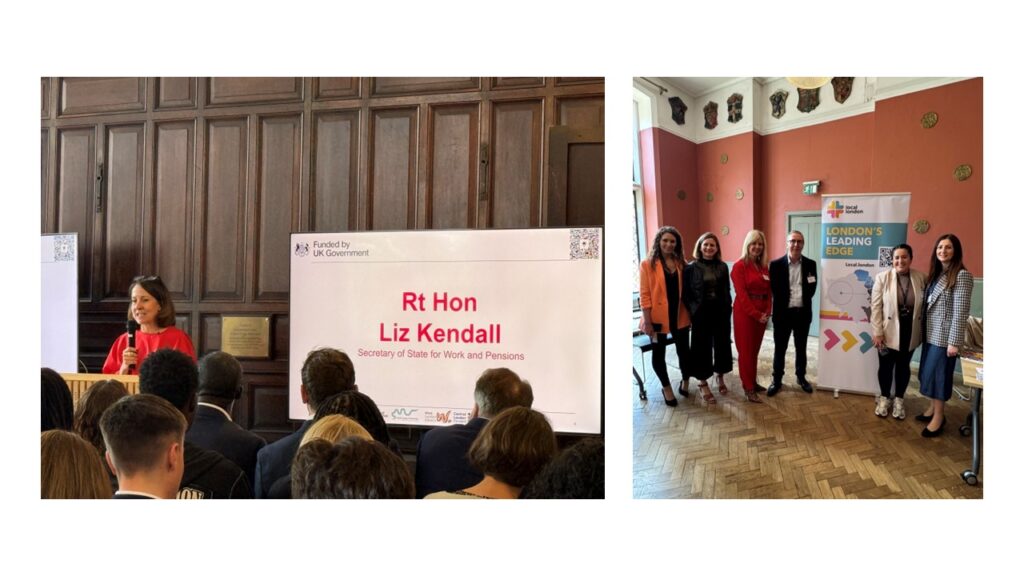
The Get Britain Working Trailblazers focus on joining up existing local services in the employment, health and skills, and youth industries to get people into work. The five programmes will work with more than 5,000 Londoners over the course of one year and will use innovative approaches including:
The schemes will support the London Growth Plan, launched by London Councils and the Mayor earlier this year to turbocharge London’s economy, and will form part of the Inclusive Talent Strategy that the GLA and London Councils are developing to build a skilled workforce in the city.
London boroughs working in four sub-regional partnerships – Central London Forward, Local London, South London Partnership and West London Alliance – and City Hall will also continuously evaluate the programme to significantly increase the number of Londoners getting into training, finding good jobs and progressing at work.
For London’s businesses and employers, this will mean more people with a range of skills and experience in the labour market – ready to fill vacancies, boost productivity and increase economic growth. This will also make it easier for employers to benefit from London’s diversity and champion inclusive practices to make work more accessible.
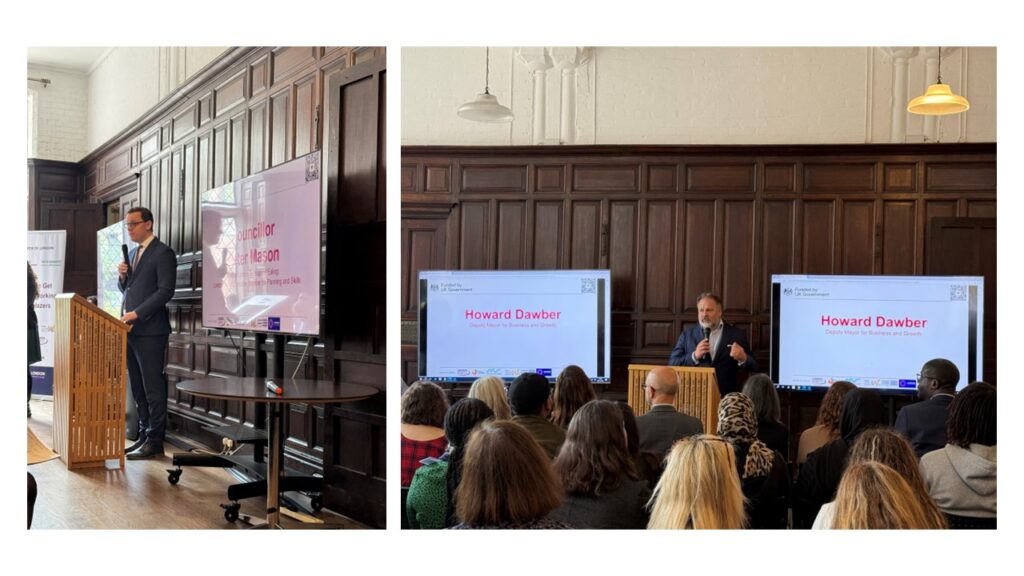
London’s Get Britain Working Trailblazers were launched at Toynbee Hall on Thursday 8 May with speeches by UK Work and Pensions Secretary Liz Kendall, London Councils’ Executive member for Skills, Cllr Peter Mason and London’s Deputy Mayor for Business and Growth, Howard Dawber.
Cllr Peter Mason, London Councils’ Executive member for Planning and Skills, said:
“With 1.3 million Londoners currently economically inactive and 1 in 5 young people in the capital unemployed, it's vital we have high-quality local support in place to help remove barriers to employment and support people into jobs and training. Not only will this benefit our residents and improve living standards, it will allow us to make most of the untapped potential and talent in our city in order to drive inclusive economic growth.
“Thanks to the Government’s £30 million trailblazer funding for London, boroughs have the investment boost we need to test new and innovative approaches, working through our sub-regional partnerships to learn what works best. These trailblazers will help pave the way for long-term transformation of employment support services, ensuring they are more integrated, deliver better outcomes and ensure the best possible value for public money."
Howard Dawber, London's Deputy Mayor for Business and Growth, said: “The Mayor is committed to getting more Londoners into good jobs.
“We have ambitious targets in the new London Growth Plan to not only create jobs but good jobs, where people can start real careers and can thrive. This funding will allow us to reach people who most need support and help them to train for good futureproof jobs.
“Working together with national Government and local boroughs will mean we can build a better-skilled workforce and a better, fairer, more prosperous London for everyone.”
The Government-backed trailblazer schemes have been launched across the UK. The nine inactivity and eight youth trailblazers across the country, backed by £170m, are a key part of the Government’s plan to Get Britain Working to put more money in people’s pockets under the Plan for Change.
London is the only region in the country to receive more than one trailblazer; there will be 5 Trailblazers with a total funding amount of £30m. The five innovative new programmes will be led by Central London Forward, Local London, South London Partnership, and the West London Alliance Sub-Regional partnerships. Sub-Regional Partnerships (SRPs) groups of boroughs working together via a single organisation.
London Councils is the collective of local government in London.
Where shared ambitions are developed, agreed, championed, and delivered at London Councils by members working together.
Where boroughs speak as one and collaborate with the government, the Mayor of London, the London public sector, the third sector, business, and other key UK and international cities.
More about London Councils here: www.londoncouncils.gov.uk
Gemma Kappala-Ramsamy
020 7934 9842
gemma.kappala-ramsamy@londoncouncils.gov.uk

Produced by independent think-tank, Localis, this report highlights key findings from conversations with frontline staff involved in helping people find work or training opportunities. This research has informed the direction of travel for the Local London Integration Hub, including the development of a sub-regional Local London Standard Framework setting out the level of service that residents should receive regardless of which borough they are in and their point of access.
We’re excited to announce that we will be launching two new programmes that will help over 16,000 people find work in our nine boroughs.
These new employment support schemes, representing around £60 million investment into the sub-region, will join our portfolio of programmes that have already helped more than 26,000 people get closer to the job market.
Both programmes will complement the services that are already available from council services and Jobcentre Plus, by helping people who may not otherwise get support.

Connect to Work is a three-year* Government-funded programme that will be available to people with disabilities, those with health conditions and people with complex barriers to employment in all nine of our boroughs.
The programme will focus on giving people the support they need to get into good work quickly and then provide ongoing support to the employer and employee to help them develop in that role.
We are working with the Department of Work and Pensions and our boroughs to finalise plans to go live this summer.
Launching soon, Trailblazers, a one-year programme, will trial innovative approaches to support people who are economically inactive into work.
This will include a mix of self-employment or business start-up support, childcare contributions, and training to help people find and stay in work.
Sign up to our newsletter to stay up to date with Trailblazers, Connect to Work, and our other employment, skills and careers support.
Discover more about our employment programmes.
*with potential to extend for a further two years.
In March, we were delighted to join partners delivering Local Skills Improvement Plans (LSIPs) across London at Business LDN’s Skills Summit 2025.
Now in its second year of delivery, London’s Local Skills Improvement Plans (LSIPs) are employer-led and data-driven blueprint for aligning training and education with current and future business needs.
The Skills Summit brought together 200 business leaders, education and training providers, government stakeholders and London’s sub-regional partnerships to celebrate the collaboration that employer-led and data-driven LSIPs have created to help close skills gaps across London.
Rt Hon Baroness Smith of Malvern, Minister for Skills, and Mete Coban MBE, Deputy Mayor for London for Environment and Energy addressed the Summit, which explored how businesses, training providers and public sector bodies can progress the transformation of skills and training in London in an era of change and new ambition.
Speaking at the event Forogh Rahmani, Director of Local London outlined the importance of the LSIP for the sub-region: “Our LSIP is the result of research with businesses and stakeholders across our nine boroughs, highlighting five key sectors and eight cross-cutting themes that we are addressing to help close skills gaps. Through the Skills Providers Network, colleges and training providers are responding positively to employers needs, developing courses and learning solutions that make the most of local resources to prepare people across our boroughs for work in high-demand and growing sectors. This is strengthening relationships and ultimately helping people gain the job skills they need to enjoy exciting careers here.”
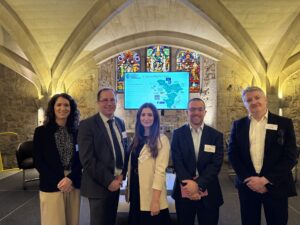
Joined by Chris Burr, Group Director – Partnership and Strategy, and Philip Bourne Digital Consultant from London South East Colleges, we shared what is happening in our boroughs with the pan-London audience. This includes the development of high-tech immersive learning suites implemented across 20 Collaborative Delivery Partners (CDPs) that will help colleges share resources and better prepare learners for work in key sectors.
Attendees also gained valuable insights into the innovative strategies and partnerships that are shaping the skills landscape in the sub-region through the Local London Skills Providers Network.
The LSIP initiative has been confirmed for another three years with a refresh planned for autumn 2025 under the oversight of Skills England, which aims to build a coherent picture of skills gaps across the country and how they can be addressed.
Find out more about our LSIP work: www.local.london/lsip
Watch the film: https://youtu.be/aOAbu9XU1ik
Our Work and Health Programme has helped over 21,000 people across our nine boroughs to either find work, training, or taken them closer to the job market.
While the programme is no longer taking referrals, our employment support team is working hard with our delivery partners to ensure people on the programme are getting the best support possible to find long-term work they enjoy.
This year already our partners have organised over 35 events and workshops to help people find work, and many more activities are planned.
One of the thousands of people who have been helped to find work and transform their lives, is Nick from Greenwich, who joined the Work and Health Programme in March 2024, facing an abrupt career change prompted by health issues. Nick was supported by Greenwich Local Labour and Business (GLLaB) who deliver our Work and Health Programme in Greenwich.

Having built a successful career in the retail industry, Nick’s forced career change due to health issues was not easy. It affected his confidence, but he was determined to rebuild his life.
Nick joined the Local London Work and Health programme and quickly received vital support from the team’s health specialists who guided him through the emotional and practical challenges posed by his health changes. This helped him adapt and foster a renewed sense of self-belief.
The Work and Health Programme team referred him onto a Level 1 Digital Skills course at Lewisham College. This proved pivotal. He embraced the learning experience, excelling in the course to the extent that his tutor encouraged him to pursue a higher-level course. To facilitate his learning, partners at Greenwich’s GLLaB team provided him with a laptop, enabling him to practice at home.
It wasn’t long before Nick showed an interest in an ‘Assembly Technician’ apprenticeship. Nick actively engaged in CV reviews and mock interview sessions. His enthusiasm was evident, and his confidence grew daily. Despite his efforts, he was unsuccessful. But Nick did not give up.
Nick continued to engage with the programme’s work club regularly, receiving support with job searches, CV reviews, and interview preparation. He also participated in recruitment sessions run by the programme, meeting with potential employers both in group settings and one-to-one sessions.
One of the defining moments in his journey was attending the annual GLLaB jobs fair. This event gave him the chance to meet prospective employers and network with key industry contacts. Notably, he met the local Mayor and this lifted his spirits.
During the event, Nick connected with a recruitment agency offering ‘Manufacturing Operator’ roles. The position involved a high level of technical skill and precision assembling mechanical and electro-mechanical sub-sea and land-based telecommunications equipment. This appealed to Nick and put himself forward to attend an assessment. His enthusiasm and potential shone, and was offered an interview.
With the support of the Work and Health programme’s employer engagement team, Nick took onboard the one-to-one tailored interview preparation. This meant he aced the interview and was offered the job!
To ensure he was work-ready, the programme provided travel-to-work expenses and high street vouchers to purchase work attire.
Since starting his new role some months ago, Nick has been thriving. He is enjoying working with his hands, and methodically assembling complex items.
Nick’s key worker at GLLAB said “Nick’s journey is a testament to his perseverance, resilience, and the power of tailored support. From navigating setbacks to embracing new learning opportunities, he has not only secured employment but also regained his confidence, self-belief, and passion for work. His ability to transition from a 20-year career in retail management to a hands-on technical role demonstrates his adaptability and commitment to personal growth.”
Find out more about our Employment Support Programmes
*Name changed.
Across the sub-region, partners are working together to help close the skills gaps prioritised in our LSIP (Local Skills Improvement Plan). Whilst we are engaging with employers to ensure that the plan delivers their needs, our partners at the Local London Skills Providers Network are bringing together training and education providers to respond to the LSIP.
Through the network, training and education providers are developing new ways of teaching skills to meet business needs.
This was showcased at the Working at Heights business breakfast hosted recently by Capital City College and the Local London Skills Providers Network for employers in industries where safety at height is critical, ie construction, building maintenance, electrical work, cleaning, and wind turbine operations.
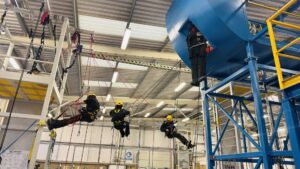
In partnership with 3T, a leading training provider in the global offshore market, Capital City College and the Skills Providers Network have developed a suite of industry-specific courses to address gaps directly supporting LSIP priorities in construction, engineering and green jobs. These include:
The event also included a fascinating tour and demonstration of Capital City College’s state-of-the-art rope access facilities (pictured) and wind turbine maintenance workshop in Enfield, where students gain vital practical experience in maintaining and servicing wind turbines.
This free training offers local people access to hands-on upskilling opportunities in the growing green jobs sector that align both with our LSIP priorities and the UK Government’s net-zero targets.
Discover our LSIP for the sub-region
Discover the Local London Skills Providers Network
Digital connectivity is fundamental to unlocking growth across our sub-region and beyond.
We were delighted to share insights into digital investment needs across our boroughs in the Thames Estuary Growth Board’s recently launched ‘Fair Economic Growth through Digital Connectivity’ paper.
The paper sets out the Growth Board’s plan to establish the Thames Estuary region as the UK’s next AI and digital powerhouse. We back the Board’s call to action for targeted support and bold public-private sector collaboration across east London, north Kent and south Essex to drive forward the UK’s digital future.
While we have secured around £20m investment into our boroughs to improve digital connectivity, our research highlights barriers preventing us from achieving ubiquitous world-class connectivity befitting of expectation of being part of London.
As a result, we need additional funding to:

⇒Read our Delivering Economic Growth in Local London: Digital Connectivity Requirements paper.
Cllr Anthony Okereke, Chair of Local London and Leader of the Royal Borough of Greenwich, said “As the fastest growing part of the capital with a population greater than the cities of Birmingham, Manchester and Liverpool combined, we welcome the Thames Estuary Growth Board’s position paper. We are committed to creating inclusive growth for people and businesses in our sub-region; investment in digital infrastructure to tackle over 100,000 premises without gigabit capable broadband connectivity is fundamental to achieving this and supporting local, regional and national economic growth.”
Mayor Rokhsana Fiaz OBE, Local London representative of the Thames Estuary Growth Board and Mayor of Newham London, said “We know that digital inclusion is vital for our people as the impact of technology and the digital age is changing how we live and accessibility will inform life chances. The government has placed a priority on addressing digital access because the digital exclusion numbers are stark, with 1.6 million people in the UK currently not online. Across the Local London area it is even more pronounced, with 100,000 premises not connected or amongst the lowest level of digital capability meaning that the opportunities of life are curtailed.
That’s why we have an ambition through our involvement in the Thames Estuary digital corridor, which will bring high-speed connectivity to east London as this report sets out. It will enable digital inclusion for our people so that they can seize the opportunities of economic growth, over sustaining digital ‘not spots’ which is holding our people back. That’s why fair economic growth through digital connectivity in our boroughs and across the Thames Estuary region is a must.”
Below: map showing slow and no connectivity areas in Local London boroughs and beyond.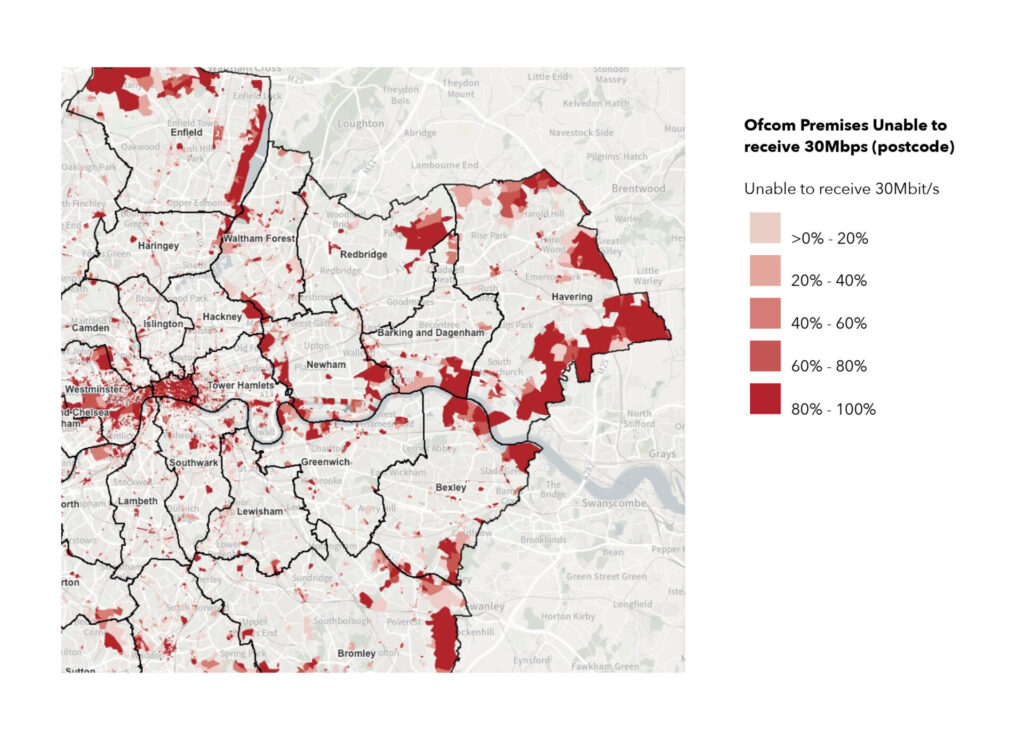
The Thames Estuary region, one of two nationally important growth corridors intersecting the Local London sub-region, has the potential to add £190bn to the UK economy by 2050[1].
The Local London economy represents around £55bn[2], with potential to increase with the right investment. Our boroughs are working together through Local London to unlock sustainable inclusive growth across north east and south east London.
[2] ONS snapshot data from 2022 (not adjusting for inflation)
We are delighted to share that Mayor Rokhsana Fiaz OBE has joined the Thames Estuary Growth Board as its newest Board member.
Representing Local London, Mayor Fiaz will ensure the interests of boroughs in the north east and south east of the capital are integral to the Thames Estuary Growth Board’s fair, sustainable ambitions for economic growth.
Mayor Fiaz OBE, Mayor of Newham was appointed by her peers to represent the nine boroughs comprising Local London, a dynamic sub-region representing around 2.6 million residents and 100,000 businesses, to consolidate relationships with the Thames Estuary, the UK’s biggest growth opportunity.
The Mayor will be joining a highly accomplished board which includes Jules Pipe, Deputy Mayor of London for Planning and Regeneration, Councillor Teresa O’Neill OBE, Leader of Bexley Council and Councillor Anthony Okereke, Leader of the Royal Borough of Greenwich and Chair of Local London.
The board also boasts a diverse range of private sector leaders, including Devrim Celal, CEO of KrakenFlex, Gavin Chapman, Managing Director at Barclays, and Vera Kukic, Partner in IBM’s Strategy Consulting Business. Their collective expertise ensures a robust and dynamic approach to driving growth and innovation across the Thames Estuary region.
In addition to sharing geography, the Thames Estuary Growth Board and the Local London partnership are both committed to driving inclusive economic growth and regeneration, ensuring communities benefit from investment and opportunity.
Cllr Anthony Okereke, Chair of Local London and Leader of the Royal Borough of Greenwich, said: “Our Local London boroughs are distinct from other parts of the capital. We have challenges, but also huge opportunities that are shared across the Thames Estuary region. We are all committed to driving sustainable and inclusive growth that benefits all of our communities, and I am delighted that Mayor Fiaz will represent our boroughs and continue our close connection with the Thames Estuary Growth Board.”
Kate Willard OBE, Thames Estuary Envoy and Chair of the Growth Board, said: “Mayor Fiaz’s commitment to fair growth and social impact aligns perfectly with our vision for the Thames Estuary. She is a proven leader who understands how to turn bold ideas into tangible benefits for local communities. We are thrilled to have her on board as we continue driving investment, infrastructure, and opportunity across the region.”
Mayor Rokhsana Fiaz OBE, Mayor of Newham and representative of Local London, said: “The Thames Estuary, including the dynamic boroughs to the east of London, is central to the future prosperity of the whole country as we support the government’s national growth mission to drive better living standards through investment to build more homes and create jobs. I’m excited to be joining the Growth Board at such a crucial time and look forward to getting stuck in as we unlock the wealth of opportunities for communities across the Thames Estuary and accelerate sustainable development and fair growth.”
Mayor Fiaz’s appointment further strengthens the Growth Board’s partnership with London’s local authorities, ensuring that the voice of communities remains at the heart of its work to attract investment, drive innovation, and support fair growth.
Discover our Three Year Plan: Towards 2026
The Thames Estuary Growth Board is dedicated to unlocking the economic potential of the Thames Estuary. By fostering collaboration, driving investment, and spearheading innovative development projects, the Board is committed to transforming the Estuary into a thriving, sustainable, and economically vibrant region.
The Growth Board works to engage national and international investors, showcasing the Estuary’s potential as a prime location for investment. Through targeted initiatives, the board will highlight key development sites, foster investor relations, and drive forward the region’s economic prospects.
The Growth Board remains steadfast in its commitment to driving growth that is not only economically beneficial but also equitable and environmentally sustainable. Through these strategic initiatives and the dedicated support of our stakeholders, we are setting the stage for a brighter, more prosperous future for the Thames Estuary.
Find out more: www.thamesestuary.org.uk
Media Contact: Hannah Staunton, Director of Communications at the Thames Estuary Growth Board. Email: press@thamesestuary.org.uk
Local London is a sub-regional partnership of nine boroughs: Barking and Dagenham, Bexley, Bromley, Enfield, Greenwich, Havering, Newham, Redbridge and Waltham Forest.
Representing around 2.6 million residents and 100,000 businesses, we are a champion for this sub-region to ensure it responds to a set of mutual issues and challenges, and benefits from existing and emerging opportunities.
Find out more: www.local.london
Local London Media contact: helen.mckay@redbridge.gov.uk / 07796 837 411
Rokhsana Fiaz OBE has served as Executive Mayor of Newham since May 2018, delivering her Building a Fairer Newham plan.
She is portfolio lead for Inclusive Economy, Strategic Housing Delivery and Culture, including community wealth building, place and economic regeneration, planning and development; and leads on the ambitious affordable social housing programme.
She is London Council’s Data and Innovation lead, co-chair of the Royal Docks Enterprise Zone and chair of the Local London Growth and Recovery Board. Previously she was CEO of an international UNESCO supported charity and has led large-scale capital projects for councils, European Commission and Council of Europe. In 2009 she was awarded the Order of the British Empire for services to Black and Minority Communities.
Local London is delighted to announce the appointment of Forogh Rahmani as the new Director of Local London.
Previously Strategy and Policy Lead for employment and skills at the GLA, and most recently Director of Growth at the Hertfordshire Growth Board, Forogh has a wealth of relevant experience that will benefit Local London.
Welcoming Forogh, Cllr Okereke, Chair of Local London and Leader of the Royal Borough of Greenwich, said “I am delighted to welcome Forogh as the new Director of Local London. Forogh not only brings with her great experience, but also enormous passion for driving growth that makes her the ideal person to head up our dynamic sub-region’s partnership. As Chair of Local London, I would like to welcome her to London’s leading edge!”
As Director of Local London, Forogh is motivated to continue to build the profile of Local London, working closely with our Board and partners to identify key areas for collaboration and advocacy.
Forogh Rahmani, Director of Local London said “I am excited to be joining Local London. As a London resident, I know that north east and south east London boroughs face challenges that cannot be lost in assumptions about being part of the capital. This is a sub-region full of potential and opportunities, and I am looking forward to advocating on behalf of our boroughs to catalyse growth that benefits all people living, studying and working here.”
Local London thank Stephen O’Leary for managing the team in the interim period, establishing new programmes and additional funding to support local residents, and ensuring a smooth handover to Forogh.
⇒Follow Forogh on Linkedin
⇒Discover our ambitions in our Three Year Plan: Towards 2026
⇒Watch our video about who we are and what we do